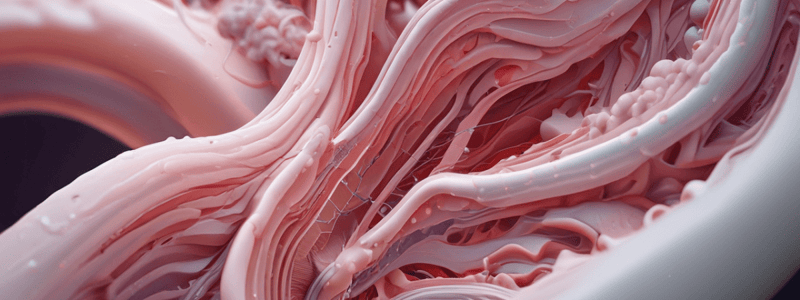Podcast
Questions and Answers
Which of the following is NOT a factor that affects the tensile modulus (stiffness) of cartilage?
Which of the following is NOT a factor that affects the tensile modulus (stiffness) of cartilage?
- Density of collagen fibers
- Type or amount of collagen cross linking
- Orientation of collagen fibers
- Articular cartilage's permeability under compression (correct)
As the density of collagen fibers in cartilage increases, the tensile modulus (stiffness) of the tissue will typically:
As the density of collagen fibers in cartilage increases, the tensile modulus (stiffness) of the tissue will typically:
- Decrease
- Remain constant
- Increase (correct)
- Become more variable
How does the orientation of collagen fibers in cartilage affect the tensile modulus (stiffness) of the tissue?
How does the orientation of collagen fibers in cartilage affect the tensile modulus (stiffness) of the tissue?
- Tensile modulus is independent of collagen fiber orientation
- Tensile modulus varies inversely with the degree of fiber alignment
- Fibers oriented perpendicular to the joint surface have higher tensile modulus
- Fibers oriented parallel to the joint surface have higher tensile modulus (correct)
How does the degree of collagen cross-linking in cartilage affect its tensile modulus (stiffness)?
How does the degree of collagen cross-linking in cartilage affect its tensile modulus (stiffness)?
How does the permeability of articular cartilage change with increasing compressive strain and pressure?
How does the permeability of articular cartilage change with increasing compressive strain and pressure?
Which of the following factors can cause variations in the tensile modulus (stiffness) of articular cartilage?
Which of the following factors can cause variations in the tensile modulus (stiffness) of articular cartilage?
What is the primary factor that governs the normal swelling behavior of articular cartilage?
What is the primary factor that governs the normal swelling behavior of articular cartilage?
What is the primary cause of the viscoelastic behavior of articular cartilage?
What is the primary cause of the viscoelastic behavior of articular cartilage?
What is the relationship between the hydraulic permeability 'k' and the creep behavior of cartilage in a confined compression test?
What is the relationship between the hydraulic permeability 'k' and the creep behavior of cartilage in a confined compression test?
How does the collagen-proteoglycan network integrity affect the hydration of articular cartilage?
How does the collagen-proteoglycan network integrity affect the hydration of articular cartilage?
How does the orientation of the collagen fibers in articular cartilage affect its mechanical properties?
How does the orientation of the collagen fibers in articular cartilage affect its mechanical properties?
How does the degree of cross-linking in the collagen fibers affect the tensile modulus of articular cartilage?
How does the degree of cross-linking in the collagen fibers affect the tensile modulus of articular cartilage?
Which region of the tensile force-deformation curve for cartilage corresponds to the straightening and un-crimping of collagen fibrils?
Which region of the tensile force-deformation curve for cartilage corresponds to the straightening and un-crimping of collagen fibrils?
In the linear region of the tensile force-deformation curve for cartilage, what is the behavior of the collagen fibrils?
In the linear region of the tensile force-deformation curve for cartilage, what is the behavior of the collagen fibrils?
Which of the following factors contributes to the anisotropic mechanical behavior of cartilage?
Which of the following factors contributes to the anisotropic mechanical behavior of cartilage?
Under compressive loading, which of the following mechanisms contributes to the resistance of cartilage to compression?
Under compressive loading, which of the following mechanisms contributes to the resistance of cartilage to compression?
Which of the following statements is true regarding the tensile modulus of cartilage?
Which of the following statements is true regarding the tensile modulus of cartilage?
Which of the following factors contributes to the high compressive stiffness of cartilage?
Which of the following factors contributes to the high compressive stiffness of cartilage?
Flashcards are hidden until you start studying




